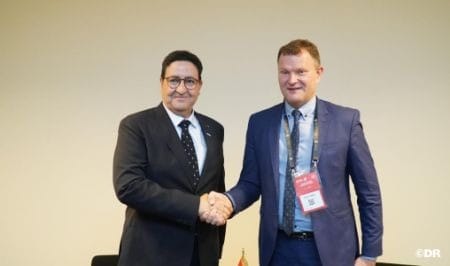Morocco and Russia are intensifying discussions around transport cooperation, with civil aviation emerging as a key pillar of their strategic engagement.
On the margins of the Global Forum on Transport Connectivity in Istanbul, Morocco’s Minister Delegate for Transport, Abdessamad Kayouh, met with Russia’s Deputy Minister of Transport, Dmitry Zverev, to explore expanding air links between Rabat and Moscow. The two officials discussed upgrading the current air route to a daily service to meet growing demand from Moroccan and African travellers.
“We are witnessing increasing interest in this route, and daily flights could respond to both economic and tourism needs,” Kayouh noted during the talks.
The discussions also touched on a broader partnership framework. Both sides signalled readiness to sign a memorandum of understanding covering road, rail, and maritime transport in the near future. Zverev reaffirmed Moscow’s commitment to supporting Morocco’s civil aviation sector while exploring ways to collaborate on infrastructure projects across various modes of transport.
Addressing delegates at the forum, Kayouh emphasized that Morocco’s regional transport policy is deeply aligned with King Mohammed VI’s Africa-centered diplomatic vision.
“African connectivity is not just a goal—it is a strategic necessity,” he said. “Morocco is committed to infrastructure projects that unlock regional trade and integration, particularly for landlocked nations in the Sahel.”
Kayouh pointed to the Dakhla Atlantic Port as a transformative project that will grant Sahel countries direct access to the Atlantic, facilitating deeper links with the global economy. He also referenced the broader Atlantic Initiative, which seeks to create a corridor for trade and development between Sub-Saharan Africa and the Atlantic space.
However, Kayouh was candid about the hurdles: inadequate infrastructure, regulatory mismatches, coordination gaps, and financing shortfalls continue to impede Africa’s integration efforts.
To address these, he called for urgent implementation of the African Continental Free Trade Area (AfCFTA), along with the development of multimodal transport corridors and enhanced investment in cross-border logistics.
“Morocco is building regional logistics powerhouses—from Tanger Med to Nador West Med and the upcoming Dakhla Atlantic hub,” he said. “These are not just ports—they are gateways between Africa and the world.”
The meeting underlined Morocco’s growing role as a continental logistics hub and its intent to deepen global partnerships that support African development. For Rabat and Moscow, this may be just the beginning of a larger strategic alignment in the transport sector.



